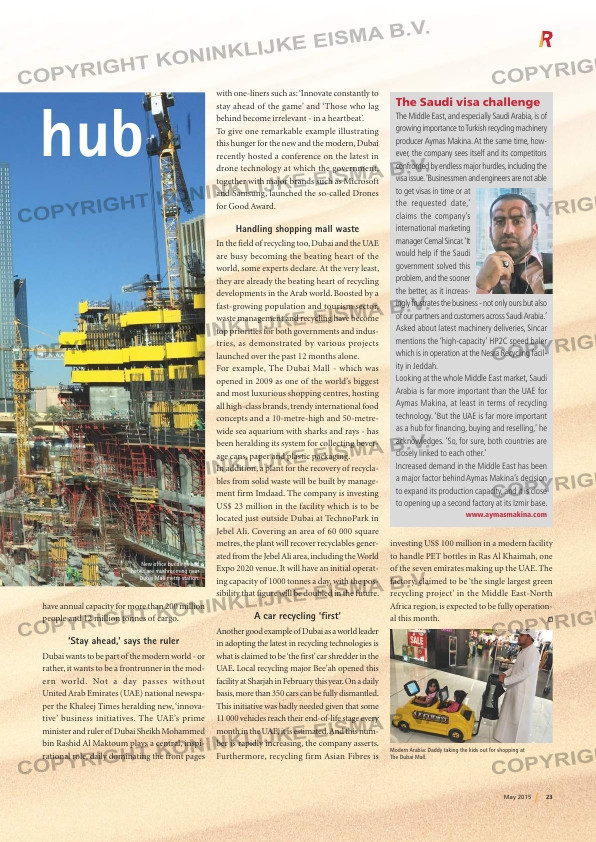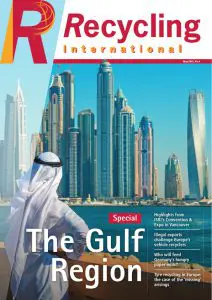Page 23 from: May 2015

have annual capacity for more than 200 million
people and 12 million tonnes of cargo.
‘Stay ahead,’ says the ruler
Dubai wants to be part of the modern world – or
rather, it wants to be a frontrunner in the mod-
ern world. Not a day passes without
United Arab Emirates (UAE) national newspa-
per the Khaleej Times heralding new, ‘innova-
tive’ business initiatives. The UAE’s prime
minister and ruler of Dubai Sheikh Mohammed
bin Rashid Al Maktoum plays a central, inspi-
rational role, daily dominating the front pages
with one-liners such as: ‘Innovate constantly to
stay ahead of the game’ and ‘Those who lag
behind become irrelevant – in a heartbeat’.
To give one remarkable example illustrating
this hunger for the new and the modern, Dubai
recently hosted a conference on the latest in
drone technology at which the government,
together with major brands such as Microsoft
and Samsung, launched the so-called Drones
for Good Award.
Handling shopping mall waste
In the field of recycling too, Dubai and the UAE
are busy becoming the beating heart of the
world, some experts declare. At the very least,
they are already the beating heart of recycling
developments in the Arab world. Boosted by a
fast-growing population and tourism sector,
waste management and recycling have become
top priorities for both governments and indus-
tries, as demonstrated by various projects
launched over the past 12 months alone.
For example, The Dubai Mall – which was
opened in 2009 as one of the world’s biggest
and most luxurious shopping centres, hosting
all high-class brands, trendy international food
concepts and a 10-metre-high and 50-metre-
wide sea aquarium with sharks and rays – has
been heralding its system for collecting bever-
age cans, paper and plastic packaging.
In addition, a plant for the recovery of recycla-
bles from solid waste will be built by manage-
ment firm Imdaad. The company is investing
US$ 23 million in the facility which is to be
located just outside Dubai at TechnoPark in
Jebel Ali. Covering an area of 60 000 square
metres, the plant will recover recyclables gener-
ated from the Jebel Ali area, including the World
Expo 2020 venue. It will have an initial operat-
ing capacity of 1000 tonnes a day, with the pos-
sibility that figure will be doubled in the future.
A car recycling ‘first’
Another good example of Dubai as a world leader
in adopting the latest in recycling technologies is
what is claimed to be ‘the first’ car shredder in the
UAE. Local recycling major Bee’ah opened this
facility at Sharjah in February this year. On a daily
basis, more than 350 cars can be fully dismantled.
This initiative was badly needed given that some
11 000 vehicles reach their end-of-life stage every
month in the UAE, it is estimated. And this num-
ber is rapidly increasing, the company asserts.
Furthermore, recycling firm Asian Fibres is
investing US$ 100 million in a modern facility
to handle PET bottles in Ras Al Khaimah, one
of the seven emirates making up the UAE. The
factory, claimed to be ‘the single largest green
recycling project’ in the Middle East-North
Africa region, is expected to be fully operation-
al this month.
The Saudi visa challenge
The Middle East, and especially Saudi Arabia, is of
growing importance to Turkish recycling machinery
producer Aymas Makina. At the same time, how-
ever, the company sees itself and its competitors
confronted by endless major hurdles, including the
visa issue. ‘Businessmen and engineers are not able
to get visas in time or at
the requested date,’
claims the company’s
international marketing
manager Cemal Sincar. ‘It
would help if the Saudi
government solved this
problem, and the sooner
the better, as it increas-
ingly frustrates the business – not only ours but also
of our partners and customers across Saudi Arabia.’
Asked about latest machinery deliveries, Sincar
mentions the ‘high-capacity’ HP2C speed baler
which is in operation at the Nesra Recycling facil-
ity in Jeddah.
Looking at the whole Middle East market, Saudi
Arabia is far more important than the UAE for
Aymas Makina, at least in terms of recycling
technology. ‘But the UAE is far more important
as a hub for fi nancing, buying and reselling,’ he
acknowledges. ‘So, for sure, both countries are
closely linked to each other.’
Increased demand in the Middle East has been
a major factor behind Aymas Makina’s decision
to expand its production capacity, and it is close
to opening up a second factory at its Izmir base.
www.aymasmakina.com
A buzzing recycling hub
New offi ce buildings and
hotels are mushrooming near
Dubai Mall metro station.
Modern Arabia: Daddy taking the kids out for shopping at
The Dubai Mall.
23May 2015
RI 4-ME_intro.indd 23 04-05-15 09:53



